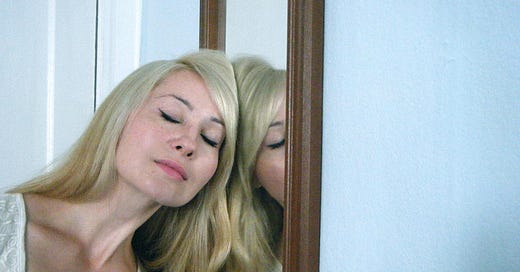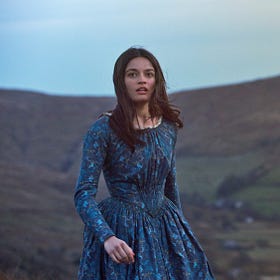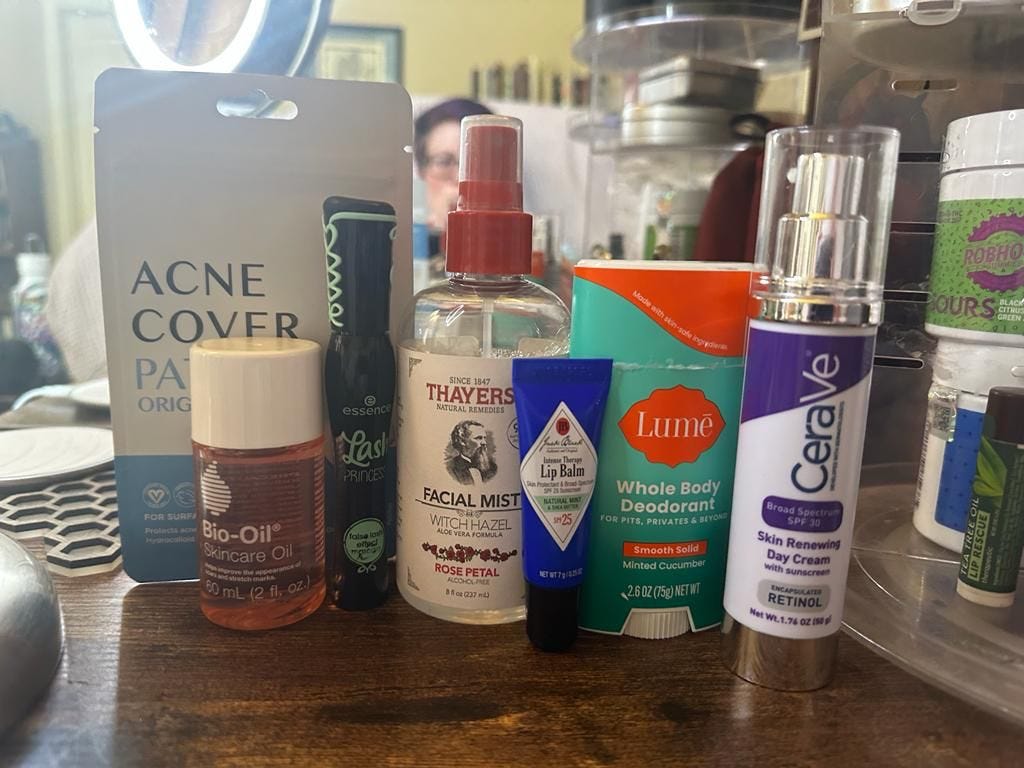Sad
There seems to be a vocal minority of people who hate Blake Butler for writing Molly, a memoir about his relationship with writer Molly Brodak, who committed suicide in 2020. They accuse him of writing revenge porn, of exposing Molly when she cannot consent to his use of her private correspondence, of depicting himself as a wonderful husband when really he’s a liar and cheater himself. I’m curious about it because it’s very vitriolic and are these people who have always hated him, as a writer, or perhaps as a person? Are these friends of Molly’s who are speaking out? I don’t know. I did not pick up on any vengeance in his text, just a person trying to process something terrible, willing to use any tools at his disposal in the absence of the person he most wished to speak to. What I can say now having read the book, knowing nothing about Blake or Molly going in, is I felt it was one of the purest expressions of love I have encountered in art.
Molly has a supernatural, fever dream quality to it that is incredibly compelling. Even the front image of Molly, slightly obscured by the glass panels of french doors, feels haunted. Molly seems to me like a powerful person who was lost to herself, to her anger, to her addictions, her secrets—there’s something almost gothic about her, ghostly, even frightening. Perhaps it’s heightened by the fact that you know all along she is dead, that she violently ripped herself out of this world like so many pages torn from a book, and now she is just as unreadable, inaccessible. Molly begins with the day of her suicide, then goes back a decade to the beginning of Butler’s relationship with her and frantically unspools into the present day.
After her death Butler speaks to her therapist and learns that Molly never discussed her hidden second life, of what I’m going to call sex addiction, with the therapist, which Butler uncovers in the days after her death. What is the point of all this time spent in therapy if you’re not going to talk about what’s really going on? he asks the therapist, who simply replies that they don’t know. Denial is so powerful. Nothing can compel a person to see or deal with what they simply do not want to see or deal with, even if it is bearing down on them and those they love like a landslide. Even if it is as obvious as a neon light. I know this in myself and have seen it in others, but it never fails to stun me. This perverse human gift of compartmentalizing is was part of what swept Molly away.
Butler is unsparring in his depiction of himself and of Molly. He does not hold back any embarrassing or highly personal details about her or himself or what they did together. Often, he does not come off great in this memoir, despite what his detractors claim. It is clear he is quite troubled, and struggling with his own trauma, beyond issues with Molly, of caring for both his parents as they died young of dementia. This memoir holds one of the most in depth depictions I have ever encountered of a couple and the weird, intricate reality two people create when they come together. Heightened of course by the gradual reveal of how deeply unknowable even the love of your life can be and how unknowable you are to yourself. There’s some scary void goo pulsing at the centre of this book, but it somehow does not get warped into nihilism under the wet weight of that existential terror.
Butler’s commitment to see and consider and love Molly as a whole person even after all that is revealed in the wake of her death, including his realization that she was abusive to him and groomed students at the university where she taught, was incredibly moving. He shares a number of spiritual experiences he had after she died that surprised me in their depth and intimacy— that he would be willing to be so vulnerable to an unknown audience of lookey loos. An image of Molly as a toddler, grinning in a highchair with food on her face, close to the end of the memoir, had me nearly in tears. Like all children her love and need for love glows on her face. By this point you are well aware of her brutal childhood, the self hatred that sprang from it like a fountain of poison, and I wished so much something could be done for that little girl, for all children, for myself. I learned a lot about Molly in this book, but I at no point felt in a position to judge her, only to mourn her, to mourn what we lose when we lose each other.
Famous
I have listened to 24 hours of the 48 hour Barbra Streisand memoir My Name is Barbra and I’m only up to 1979! I’m going to take a break now because 24 hours of any book is already a lot of book. The longest celeb memoir I read before this was the one on Natalie Wood and this beats it in length by a mile. A friend recently asked me what I was reading and I told him and he put on a humouring expression— he most likely (as many do!) sees celeb memoirs as silly— and he said, “oh, was she important? What did she do?” and I was so fully packed with Streisand info I didn’t even know where to begin. Also, his comment made me think of how strange both time and fame are. As big of a twentieth century mega star as Babs was, I don’t think she’s going to persist through the ages like an Audrey Hepburn, though Audrey Hepburn was far less prolific than she. This reminded me of when I read Furious Love, which was in part about how easily forgotten Richard Burton had become, though he was hounded by fame during his lifetime. There’s no real knowing what art or artist will be pulled through the decades, or centuries, and remembered and who or what will fade away.
The reason one can read a 48 hour long book on Barbra Streisand is because she is incredibly real and delightful. This is not a ghost written book, this is her. She goes on wonderful, meandering asides about things like her love of coffee ice cream, appreciation for damask, and thoughts about dentistry (I cannot overstate how often teeth are mentioned in this book). As Streisand states many times how important creative control is to her in all her projects, I doubt this book had anything but the lightest editor’s touch. But it’s better and weirder for that. It’s a true American dream, rags to riches story, which adds to its charm and singularity (though American capitalism would love us to believe rags to riches is common enough, we all know it almost never happens!). I’ve only read half of the book but thus far there is no explicit abuse, no assault, no rape—which, trust me, in the world of celeb bios is rare. There is a young, smart, Jewish, Brooklyn girl with an unusual face and incredible voice fighting tooth and nail to become a star. And making it!—climbing to greater and greater heights. Her life basically turned out how I thought mine would when I was a kid, except her access to Manhatten, with all its auditions, actors, agents, acting classes and clubs, provided her with a lot more opportunity than I had living in a small mining town in the Rocky Mountains lol. One thing that perpetually amazes me is how Streisand only ever wanted to be an actress, she knew she could sing but didn’t especially care about it and didn’t specifically pursue it, she kind of chanced into singing in clubs and on Broadway, and other people’s interest in her voice propelled her into stardom.
Streisand shares a lot of her clippings, which are all raves, and I started to wonder after awhile why this wasn’t annoying me. She somehow manages to seem humble while wading through all this praise without it becoming a humble brag, and her quirky personality, in which she relays many funny, internal asides like, “and then he asked me out for a drink and I said ok though I’d much rather have gone for a roast beef sandwich,” keep the memoir from becoming grandiose and self important. She comes off throughout her life as more interested in being herself, warts and all, than anyone’s idea of a star or a beauty or a diva, though she was also all of these things, but in a way completely unique to her. You can’t help but like her and root for her.
Lip Wounds
I have been decimated by this decade so far. How about you? Every year of it has just been completely awful and unrelenting. The end of 2023 was no exception. Within 48h of turning in my dissertation I got a section 21 eviction from my landlord, a “no fault” eviction, which means they can kick you out for any reason at any time. I loved my home, it felt more like home to me than anywhere I had lived since I was 10 years old, and I had been living there for years. It was my main source of security, stability, safety. It was perfectly suited to my needs as a chronically ill person, with a quiet, peaceful walk out garden in which I did indeed garden when up for it, and where I could easily let my dog out without hurting my joints by going up and down stairs. The building was small, only four flats, and we all knew each other, hung out, helped out. Everyone had dogs and did favours for each other. It was a community and it was special. That all got completely blown off the map in a matter of weeks as I scrambled to find somewhere to live, hobbling around on my sprained-ass ankle, in the middle of a major housing crisis, that would take my dog and wouldn’t destroy me with stairs. I washed up in a new neighbourhood and home that I am grudgingly grateful for in the midsts of all this societal mess, and is a perfectly fine place in many respects, but in which I feel lonely, spikey, unmoored, frustrated and exhausted by on the daily.
That is all to say that I returned to a childhood bad stress habit of chewing and peeling my lips (gross, I know). They were bloody, chapped and it was not a good scene. My regular Weleda lip balm wasn’t cutting it. I found this lip balm praised to high heaven while digging around on Sephora and it healed my lips almost completely overnight the first time I used it. It costs £6 and it’s from a French brand which I always find reassuring when getting skin products. France has stricter laws about food and skincare safety and ingredients than in the UK or US, so I find it’s often better for sensitive or damaged skin products. Anyway, if stress has destroyed your lips also, check it out.
The Bottom Shelf
January’s Bottom Shelf comes courtesy of Amber Taufen, who I interviewed about Paris Hilton in July’s newsletter—
Sad Girl Special
This month marks the one year anniversary of Sad and Famous 🎉 Thanks for being here!
As a refresher, The Bottom Shelf is a new feature about what skin/face products people “just like us” are using, loving, considering, buying repeatedly and depending on. No celebs in this section. If you’re interested in being the next Bottom Shelf, please reach out and lmk.
On to Amber!

“So, misting with this witch-hazel-and-rose-water toner helps calm and refresh my skin after cleansing. I use a bit of the Bio-Oil to soften and heal irritated areas, and the CeraVe day cream has SPF as well as retinol to address extra dry skin — it’s Colorado; my face gets thirsty! The Avarelle acne cover patches go on last. (Wish I’d had these as a teenager! They get rid of blemishes much faster than Noxzema.) The Lash Princess mascara extends my eyelashes (naturally kinda stubby) by an extreme amount. I love the Jack Black lip balm because it really soothes and heals chapped lips, which are a constant in my life (Colorado strikes again). And I swear by Lume’s deodorants. I have very sensitive underarms and can’t handle a lot of deodorants, but this stuff has been both gentle enough not to irritate me and effective enough that I’m not worried about hugging my friends.”
Previous Bottom Shelf: Kate Horowitz









i should have told you that i went out and ordered this lip stuff and it is life-changing!!!! Thank you!!
I had not heard of "Molly" and now I've put it on hold at the library (where it's on order and I'm 18th in line). In the meantime, I've been listening to the Audible version of the Streisand bio for a few weeks now (I parcel these things out). I have an Audible subscription and when I heard it was a 48-hour listen I thought, "Well, that's certainly worth $15..." And like you, I have gotten strange (even pitying) looks from people when I've told them what I'm listening to, and like you, I have had no trouble defending the memoir. I'm from central New York and a lot of people in my Jewish community whom I loved were from Brooklyn and sounded (when they spoke, anyway) just like Barbra. Now I live in Edmonton, Alberta, in western Canada, where pretty much nobody sounds like that. So listening to the audiobook is like listening to beloved people from my childhood telling me stories. I love the little tangents and asides that she throws in. I'm thoroughly enjoying it, and I really enjoyed reading your take on these things. (Sorry about your chapped lips and the eviction!)